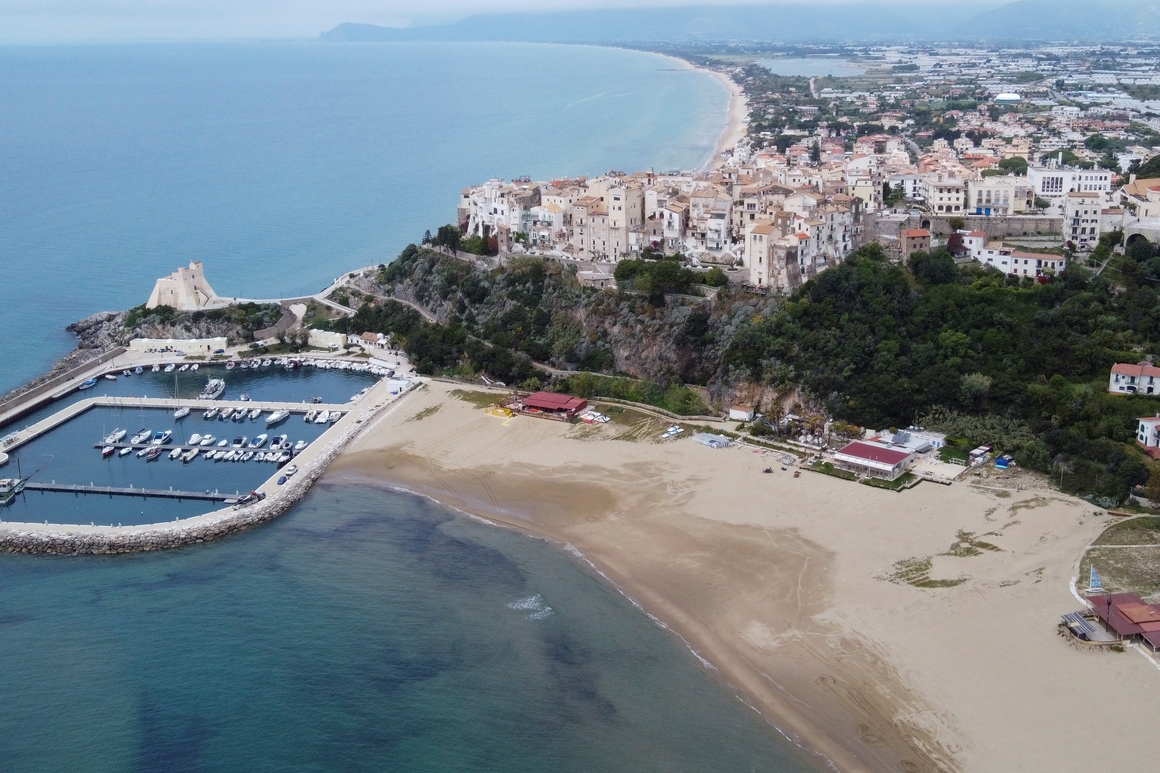
“The season usually starts at Easter,” said Rocco Gambacurta, who presides over four generations of his family at the Lido Azzurro beach club. „We won’t be able to make up for two months of lost revenues. What’s lost is lost.”
After 10 weeks of coronavirus restrictions, Italian shops, restaurants, bars and beach clubs were allowed to throw open their doors Monday. But in coastal towns like Sabaudia, the grand reopening has been characteristically chaotic, with individual regions still to define how they will safely manage access to public beaches.
In a country where a seaside holiday in August is almost a constitutional right and a deep suntan is still a must-have, Sabaudia’s 15 kilometers of free public beaches normally provide towel space for as many as 80,000 people.
But this year, to respect social distancing, only 32,000 will be allowed to enter using a smartphone booking app. That app is not yet functional, and tourists are currently banned from swimming or even planting an umbrella, although exercising on the beach is allowed.
With Sabaudia’s beach backed by dunes, rather than cliffs, it will be difficult to prevent people simply walking onto the sand, when inevitably they fail to get one of the reserved spots. Police have acknowledged that there could be a public order problem. According to local media, only the rich who can afford beach club membership will be truly free to enjoy their summer holiday.
For the seasonal businesses in Italy’s beach towns, the ongoing social-distancing regulations and uncertainty are threatening to bankrupt them just as they reopen.
According to the new rules, bars and restaurants can only serve customers seated at least 1 meter apart. At Caffetteria del Corso, a cocktail and coffee bar in central Sabaudia, this means they can serve only 12 people at a time, instead of 150 people in high season.
The café has had to furlough eight bar staff, said its owner, Stefania Beoni. After starting her business four years ago, she was just starting to make decent returns. “This should have been our breakthrough year,” she said.
Like others, she fears that their customers will be too afraid — or otherwise unable — to come on holiday. “It won’t be like other years. People are afraid to return to normality.”
As the health emergency recedes, the government — mindful of a looming economic crisis — has offered up to €500 to lower-income families who holiday in Italy this summer.
But given Italy’s history of bureaucracy and delays, many in Sabaudia are skeptical the holiday aid will materialize. Much of the financial assistance promised in March to help Italians get by during the crisis has so far failed to appear.
“By the time this money arrives, it will be 2030,” said Sergio Chiusuri, a day-tripper from Rome walking on the beach with his wife and daughter.
Business owners say they need realistic social-distancing rules, a moratorium on taxes, and compensation for lost earnings rather than loans.
Sabaudia’s Mayor Giada Gervasi said some taxes are being cut or delayed. The town hall is also planning to pedestrianize the center at night to provide more space for bars and restaurants.
But local business leaders accused Gervasi of lacking a plan. Manuele Avagliano, president of the town’s chamber of commerce, accused the mayor of leaving the owners of tourism companies “on the high seas.”
Delays in coming up with a plan for managing access to the beaches will create “dramatic consequences” for the commercial economy, he said in a statement.
Similar complaints by businesses across Italy are fueling pushback against the government from parties on the far right, for whom small coastal towns like Sabaudia have always been fertile ground.
Sabaudia’s right-wing politics is built into the town’s foundations, literally. Mussolini laid the town’s founding stones, after draining the area’s malaria-infested swamps. The town was built, in the Italian rationalist style, on a Roman grid, in less than a year, boosting the myth of fascist efficiency.
In the 1960s, the town pulled in the liberal cultural elite such as the filmmaker Pier Paolo Pasolini and the writer Alberto Moravia, retaining its prestige until the 1990s, since when its fortunes have gradually declined.
In last year’s European elections, two-thirds of Sabaudia’s voters cast their ballots for the three main parties on the right, up from 51 percent for the center-right alliance in the parliamentary elections the year before.
Last August, Sabaudia was the site of a large rally held by Matteo Salvini, as the leader of the far-right League party and then interior minister forced a government crisis he hoped would make him prime minister.
That power play backfired badly, and Salvini has since been out of power — if not out of the limelight.
Since the beginning of the crisis, Prime Minister Giuseppe Conte has enjoyed a surge in popularity.
But as Italy looks to a return to normal, national political unity is fragmenting once again, as the right seeks to capitalize on worries the government is reopening too slowly.
For the residents of Sabaudia, their concerns are purely local: how to survive the immediate future.
Mayor Gervasi, an independent, admitted it will be hard to make up for the lost time, but said she is “optimistic.”
“We can limit the damage,” she told POLITICO.
At Il Dollaro — a family owned pizzeria with pictures of former Roma football star Francesco Totti and Il Duce’s politician granddaughter Alessandra Mussolini on the wall — the mood is less upbeat.
“So many sacrifices, a life given up for this place, and for what?” said the restaurant’s owner Antonietta De Blasi. Many businesses will close, she predicted.
For now, they will try to keep going. “What else can we do?” she said. “But in September we will have to do the sums.”
Source: politico.com
See more here: news365.stream






